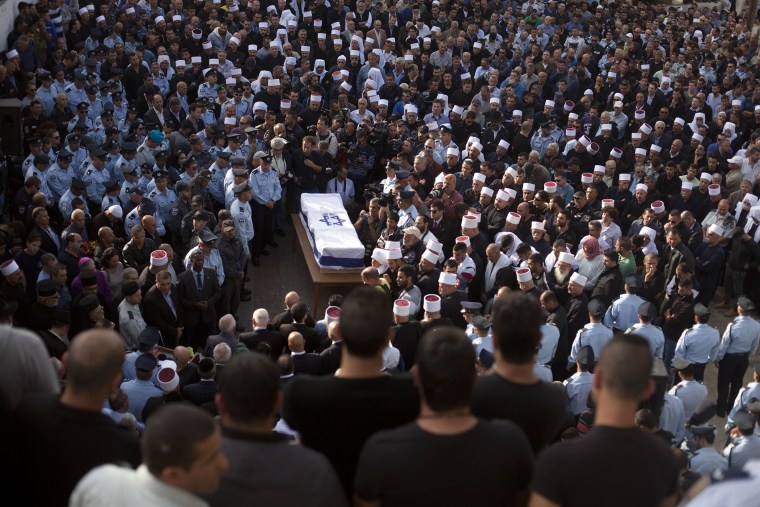JERUSALEM -- When two Palestinian men stormed a synagogue Tuesday, brutally killing four worshippers and a police officer, some Arabs hailed the assailants as martyrs to the Palestinian cause.
But the attack, which left three American rabbis dead, was also a devastating loss for a different Arab community here.
Master Sergeant Zidan Saif, a member of Israel’s Arab Druze community, was the first police officer to respond to the attack in the Har Nof neighborhood of West Jerusalem, an area within Israel’s pre-1967 borders. Saif was shot in the head during the ensuing gun battle with the attackers, two cousins from East Jerusalem who died in the shootout. Saif, 30, was pronounced dead hours later, leaving behind his wife and their 4-month-old daughter.
"We have been serving in the Israeli military since the establishment of the Israeli state. That’s why Israeli Arabs look at us as traitors."'
Israel’s Druze community numbers approximately 125,000. Saif hailed from the village of Yanuh-Jat, located in the Galilee, where most of Israel’s Druze reside. His funeral there on Wednesday attracted thousands of people, including many Jews. Israeli President Reuven Rivlin spoke at the funeral. Mordechai Rubin, the rabbi of the synagogue for which Saif gave his life, delivered the eulogy. “The loss of Zidan is our loss as well as that of the Druze community, and we feel, especially at times like this, a kinship with the Druze community,” Rubin said.
Druze leaders and residents of Yanuh-Jat praised Saif as a hero. Druze spiritual leader Muefek Tarif said, “the Druze community is going through a difficult time, tinged with sadness and pride as we lost two of our dear sons in the past two weeks who were defending the state of Israel.”
Earlier this month, Jidan Assad, a Druze border policeman was killed when a Palestinian man drove his car into a crowd of pedestrians at a light rail station. One of Israel’s top commanders in this summer’s war in Gaza was Colonel Ghassan Alian, the Druze leader of the Golani Brigade, who was hospitalized after being injured by a Hamas rocket.
Saif’s own uncle died fighting for the Israeli Defense Forces in the 1982 Lebanon War.
“We have been serving in the Israeli military since the establishment of the Israeli state,” said Dr. Fawaz Kamal, the director of the Arabic department at Israel’s Government Press Office. "That’s why Israeli Arabs look at us as traitors."
While the Druze represent just 2% of the Israeli population, they comprise approximately 30% of Israel’s security forces, according to Ayub Kara, a Druze leader who served as a deputy minister in the Israeli Knesset and remains active in Prime Minister Benjamin Netanyahu’s Likud party.
“The Muslim Arabs killed my uncle in 1939 in a raid on Acre because he was cooperating with the Jews, and in 1947, I lost another uncle,” said Kara, noting that more than 85% of young Druze men serve in the Israeli military, compared to approximately 73% of young Jewish men, some of whom forego army service because of their religious beliefs.
An offshoot of Shia Islam, the Druze are a small monotheistic religious minority spread throughout the world, with the majority living in Syria and Lebanon. Founded in Egypt in the 10th century, the Druze were persecuted for breaking away from Islam for hundreds of years, and can no longer be found in Egypt. Which is why, according to Kara, they are so devoted to the security of a country that allows them to practice their religion freely.
“Druze know the past of what happened here,” said Kara. “The Muslims killed millions of Druze throughout the Middle East. We’re afraid. So because of that we need a state that gives us respect, security and democracy.”
"Both we and you are paying a heavy price in the form of the blood of our sons."'
Dr. Kawal echoed that sentiment, claiming that the Druze community has grown even stronger because of Israel.
“Since the establishment of the Israeli state, we’ve become more independent and established as a religious sect,” said Kawal. “We have our own religious courts, our children learn our traditions at schools, and our men serve successful careers in the Israeli military.”
This contrasting view of Israel has created a sharp divide between the country’s Muslim and Druze citizens. Those tensions came to a boiling point last week, reflecting the rising temperature throughout the country amid the wave of recent terror attacks committed by Muslims against Jews. On Nov. 15, clashes between young Druze and Muslims in the Northern Israeli village of Abu Snan left 40 injured. The altercation involved mostly high school students fighting over their conflicting loyalties to Israel.
Since Tuesday’s attack at the Jerusalem synagogue, a country on edge following a violent summer has felt a new rise in tensions. At Saif’s funeral, the Druze Sheikh Muefek Tarif called on Rivlin to calm the atmosphere.
“You must do everything to lower the flames in the Holy City,” said Tarif. “Both we and you are paying a heavy price in the form of the blood of our sons. Incitement and extremism must not prevail over common sense and tolerance.”
Yardena Schwartz is a freelance journalist based in Tel-Aviv, Israel. She received an Emmy nomination as a producer for msnbc's "Andrea Mitchell Reports."
